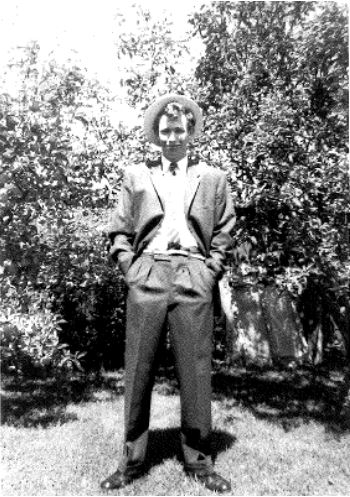
Life and Nothing Better – The First Third
A first hand account of Cashmere High School as an early pupil, written By Jeff Upton and published with permission.

The photo for this episode was taken in February 1961 and is Jeff in his new uniform.
I was excited about becoming a pupil at CHS because someone had told me that they had a Rock ‘n Roll club. I asked my cousin (a 1956 entrant) about it, and his reply “Well, if you can call it that!” turned out to be the reality. Gary Day, Fred Tuck and a battered record player in a corner of the playing fields. Unhappiness was the hallmark of my first three years at CHS. In reality, I hated it. Two curious incidents stand out in my memory of that first year. Remember Room A5 in 1957? It was empty and served various functions, including special “boys only” assemblies, sports meetings, film showings and the like. This was a meeting to discuss summer sport and taken by Bill Brittenden (BB). All the boys were present. Following BB’s spiel, he asked if there were any questions. There were several, and then a kid named Allister McRoberts raised his hand. I knew Allister quite well. We had gone through Addington Primary together and had become firm friends. We were in different classes at South Intermediate but kept in touch. He was an only child, intensely proud of his late father who had served with huge distinction in WWII, and understandably close to his mother, who was rather older than most of our parents. Anyway, Allister politely asked BB if the latter knew when interclub softball competitions were due to commence that summer season. An expression of distaste transformed the Big Man’s face, and he replied “No, I don’t. And, quite frankly, I’m not particularly interested”. Of course, in BB’s limited world, any lad who didn’t want to play cricket was obviously mentally impaired in some way or morally destitute. [Incidentally, I LOVE cricket] Many, many years later (circa 1988, in fact), I was managing a halfway house in St. Albans for people with drug and/or alcohol dependency. My next-door neighbour was a senior staff member at Aranui HS (where, coincidentally, BB was the first principal in 1961) and had taught at CHS during his long career. We were shooting the breeze one Sunday afternoon, and I related to him the incident outlined above. His response was “What
On a lighter note, I recall John Murdoch, who was both our Form and maths teacher, replying to Derek Wilson (yet another victim of metastatic melanoma), who had asked when we were going to get the results of an algebra test back. “When I have calmed down sufficiently to return them, without totally losing my temper, Wilson!” This answer went down exceedingly well with class P3B, which I am not sure is what Johnny Murdoch intended.
I also recall prize-giving a few months later. It was held outside in front of the Admin. Block (I think it might be the rose garden area now). The Reverend Brash was giving the usual clichéd rant of what a great school CHS was, and then he paused, and said: “And no doubt there are some of you who have not enjoyed your year at CHS, and I pity you.” My then-buddy, the recently deceased Gwyn Strange and I were sitting in the same row, and we turned as one to share a remarkably intense look of pathological hatred. Interesting to look back 60-odd years later and feel exactly the same way. The Rev. Brash’s male offspring has a similar effect on me still.
1958 was for me a prolonged non-event, but one incident does linger. I was taking History with Miss Sylvia Mann, and “Bing” Harding (I could never remember his real name) had smuggled a sizeable chunk of rock into the classroom (it was either Rm. B8 or B9). At the end of class he walked out to the metal rubbish bin near the door, and in a
The most important event (arguably of my life) occurred in the last month or so of 1959. We were filling in a form giving our subject preferences for 1960, and I didn’t know what I wanted to do. Murray Kane was sitting next to me, and he leaned over and said: “Biology is quite interesting, Jeff”. So with that offhand comment, the direction my life took was irreversibly sealed. I got 270 in School Cert. (and bloody Gordon Hosking got 288!) and I actually looked forward to the Lower 6th Form.
We had a new Geography teacher named Kelly; none of us knew anything about him, but he turned out to be one of the only two teachers that I would hold in absolute respect. Teacher, mentor and friend, he was a remarkable guy. He made me aware of the fact that I actually had a brain, and encouraged me to use it. For the first time in over 3 years, I began to enjoy school. When I met my future wife, it turned out that Dudley Kelly was her father’s best friend. He became principal of Mangakino High School in the central North Island and came to be regarded as a leading secondary educationalist. In retirement, he wrote a book of poems (among many other things). It was titled “Stumbling to Dance” and he handed me an autographed copy in 1996. Inside the cover, he had written “To JEFF, my brightest pupil, from your dumbest teacher!! Kind regards, Dudley”. It is a treasured possession. Dudley’s favourite quote came from the pen of French novelist and philosopher Jean-Paul Sartre, namely, “the empty attic of attainment”. It is typical of Dudley that nothing could better expose the strutting, absurd, self-obsessed pomposity of most members of our species than this bleak phrase. Dudley passed away in 2003 following a fall while visiting one of his sons in Australia. At the time of his death, he had his name down for an organised trip to Cuba. RIP, Dudley Kelly.
The Upper 6th (U6) started off quietly. Most of us intended to go on to university and regarded the Upper 6th as a lazy prelude. This turned out to be an error of judgement. There were 2 English streams in the U6, U6A and U6B. I was in U6A, a placement that allowed much ribbing of G. Hosking, who was consigned to U6B. Anyway, we had a new English teacher, one Neale Griffith, who seemed a pleasant and quiet young man. Within a few weeks, he had incurred a serious back injury and was away from school for months. U6A was forced in with U6B and teacher Jim Rendall. Finally, Neale returned (it must have been May or June) and appropriate social distinctions were restored. Within a few months, Neale had transformed me from a mediocre student into a devoted English scholar. It is unusual to remember a textbook with something akin to delight, but Sir Ernest Gowers’ “Plain Words” was a total gem. Neale Griffith was a remarkable teacher. The most important thing he taught us was how to critically evaluate writing from any source. We had two set novels for the year, Emily Bronte’s “Wuthering Heights” and Graham Greene’s “The Power and the Glory”. I loathed the former, and the genre it represented (frustrated Yorkshire virgins with their stilted prose). However, I loved the latter and it marked the beginning of a lifetime love affair with serious literature. This was around the time that Ernest Hemingway blew his brains out with a shotgun, and Neale pinned an obituary to the notice board. I can still remember the writer referring to Hemingway’s prose as hard shiny little pebbles, washed clean by the stream. We did Shakespeare’s Henry V and Othello, and it was the first time in 5 years that I had enjoyed and appreciated Shakespeare’s voluminous work. We also studied GB Shaw’s “Saint Joan”, and it still remains a favourite of mine. Go well, Neale Griffith. You are remembered by me with affection and the utmost respect.
Two incredible teachers in 5 years. Am I dismissing all the others as poor or incompetent? Well, I hope not. But for a student who was (and is) really rather dumb (me), to find a teacher who can inform and enlighten is a remarkable experience. I never had a maths teacher who could do that. Maybe it can’t happen in maths. I remember Eddie Hobson who taught us Lower 6th maths. He told me to take my hands out of my pockets, commenting “You might be able to do Geography with your hands in your pockets, Upton, but you can’t do mathematics like that!” I longed to reply “If you could actually TEACH maths it wouldn’t make any goddamn difference!” But devout cowardice intervened. Marlene Smith (nee Richardson), who took us for U6 maths, said to me (it must have been at the 50th anniversary) that my problem was laziness. I was genuinely appalled. I replied “Marlene, I was never lazy. You lost me in the first couple of days and I just could not understand what you were trying to teach.” I should have engaged the services of a maths tutor, but we (my family) could not have afforded it. One of the biggest regrets of my life is that I could not swim effortlessly in the world of mathematics.
I took home the U6 Biology and Geography prizes and watched with wretched envy as Peter Schmitz took out Physics, Chemistry and Maths.
A final word about Terry McCombs. I never really warmed to him (part of my psyche has an almost pathological anti-authoritarian streak), but I was working at Dalgety & Loan wool store in the summer of 1965-66 and became firm friends with Terry’s youngest son, Pat. [this is from Terry’s first marriage]. This friendship inevitably led me to
Terry did endear himself to me in an unusual way involving my sister Pat and The Press. One Monday morning in 1957, my sister Pat was squatting at the breakfast table [nobody could occupy a chair in as strange a manner as my sister] with her nose in The Press, whereupon she let out a screech of anger and said: “This is bloody nonsense!” The column to which she referred was an account of how, on the previous Saturday night, a former English army major had been attacked in Cathedral Square by [ye Gods] a bunch of
Next time: rock music, university, marriage, Nobel laureates, alcoholism and infidelity—stay tuned, boys and girls.

